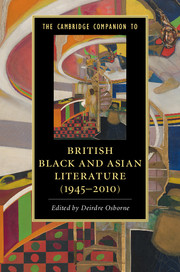Book contents
- Frontmatter
- Dedication
- Contents
- Contributors
- Acknowledgements
- Timeline
- Introduction
- PART I TRACES AND ROUTES
- PART II TRANSLOCATIONS AND TRANSFORMATIONS
- 3 Liberationist Political Poetics
- 4 Women's Fiction and Literary (Self-) Determination
- 5 Brutalised Lives and Brutalist Realism: Black British Urban Fiction (1990s–2000s)
- 6 Stages of Representation
- PART III RESTORATIONS AND RENOVATIONS
- PART IV NATIONAL, INTERNATIONAL, TRANSGLOBAL
- Further Reading
- Index
- Series list
6 - Stages of Representation
from PART II - TRANSLOCATIONS AND TRANSFORMATIONS
Published online by Cambridge University Press: 05 September 2016
- Frontmatter
- Dedication
- Contents
- Contributors
- Acknowledgements
- Timeline
- Introduction
- PART I TRACES AND ROUTES
- PART II TRANSLOCATIONS AND TRANSFORMATIONS
- 3 Liberationist Political Poetics
- 4 Women's Fiction and Literary (Self-) Determination
- 5 Brutalised Lives and Brutalist Realism: Black British Urban Fiction (1990s–2000s)
- 6 Stages of Representation
- PART III RESTORATIONS AND RENOVATIONS
- PART IV NATIONAL, INTERNATIONAL, TRANSGLOBAL
- Further Reading
- Index
- Series list
Summary
Multiculturalism has not permeated the British theatre complex to the same degree that it has informed subject matter in poetry and prose writing – despite the fact that the live body on stage is a personal and potent reminder of social presence. When social diversity does not translate into socially proportionate theatre-going demographics, this reveals much about the theatre complex itself. Three elements inspired, established and shaped what, during the 1980s, came to be broadly defined as post-war ‘Black British Theatre’: the Caribbean diaspora, race and class. In part through their drama, this Caribbean-heritage community began, from the 1970s, to contribute to a change in conceptualising what it means to be British, where ‘black British dramatists’ refers primarily to those whose families originated in the Caribbean but, increasingly since the 1990s, from Africa.
However, this has not been a straightforward process, as even the term Black British Theatre has been contested by black dramatists and practitioners. In 2009, the playwright Roy Williams argued that British theatre continues to be controlled by white people and that non-whites are marginalized. He wished to assert difference: ‘Personally I love the phrase “black theatre”, and I think we need it to ensure we are heard. Theatre sounds po-faced and white; “black theatre” sounds intriguing, daring.’ Whereas Dawn Walton, artistic director of the Eclipse Theatre Company (which aims to combat institutional racism throughout the theatre and produce work by black dramatists), argues, ‘to suggest that black theatre has to have an all-black – or even majority black – cast would eliminate plays like stoning mary by debbie tucker green or Sing Yer Heart Out for the Lads by Roy Williams from the canon of black British theatre’ and ‘to define black British theatre in terms of race alone is to miss the point’.
This chapter will explore why writing for the stage was an important contributor to the development of a culturally political syntax as derived from the African and Caribbean diaspora. However, when fashioned to represent second-generation, British-based experiences, its dramatists became overwhelmingly associated with one genre, that of social realism.
- Type
- Chapter
- Information
- Publisher: Cambridge University PressPrint publication year: 2016
- 2
- Cited by



